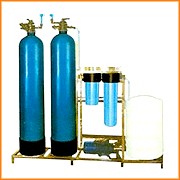Applications
Oil & Gas Sector
Pharmaceutical Industry
Hospitals
Automobile Industry
Swimming Pools
Breweries
Ion Exchange Plants
Boiler Feed Water
Chemical Industry
Textile Industry
Power Plants
Boiler Feed Water
Cation Polisher
Swimming Pools
Breweries
Ion Exchange Plants
Boiler Feed Water
Chemical Industry
Textile Industry
Power Plants
Boiler Feed Water
Cation Polisher
Demineralization Plants
Demineralization, also known as deionization of water, is the the process of removing mineral salts from water by using the ion exchange process.The following ions are widely found in raw waters :
| Cations | Anions |
|---|---|
| Calcium (Ca2+) | Chloride ( Cl-) |
| Magnesium (Mg2+) | Bicarbonate (HCO3-) |
| Sodium (Na+) | Nitrate (NO3-) |
| Potassium (K+) | Carbonate (CO32-) |
DM Plants produce mineral free water by operating on the principles of ion exchange, de-gasification and polishing.
Ion-exchange is a rapid and reversible process where raw water is passed via two small polystyrene bead filled (ion exchange resins) beds. Impurity ions present in the water are replaced by ions released by an ion-exchange resin.
The impurity ions are taken up by the resin, which must be periodically regenerated to restore it to the original ionic form.
Advantages of our DM Plants:
- Variety of cost effective standard models.
- Simpler distribution and collection systems.
- Improved aesthetics, rugged design, low maintenance and easy to install.
- Single valve operation as compared to the six valves in conventional filters.
- High shelf life
- Less power consumption
- Rust free

There are three ways in which ion-exchange technology can be used in water treatment and purification :
- Cation-exchange resins alone can be employed to soften water by base exchange.
- Anion-exchange resins alone can be used for organic scavenging or nitrate removal.
- Combinations of cation-exchange and anion-exchange resins can be used to remove virtually all the ionic impurities present in the feed water.
We also offer Electrodeionization EDI: Electrodeionization Systems remove ions from aqueous streams, typically in conjunction with reverse osmosis (RO) and other purification devices.
Our high-quality deionization modules continually produce ultrapure water up to 18.2MW/cm. EDI may be run continuously or intermittently.
